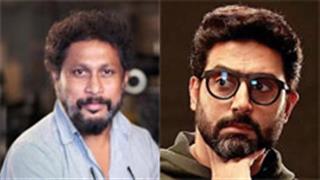Director: Shoojit Sircar
Rating: ***
Exploring the Emotional Depths of Grief, Father-Daughter Bonds, and the Triumph of the Human Spirit
Shoojit Sircar's films often delve deep into themes of grief, death, and the enduring hope that arises from life's darkest moments. His latest film, I Want To Talk, follows in the footsteps of his previous works like Piku and October, exploring loneliness, the fear of mortality, and the fragile nature of human connections. With a brilliant performance by Abhishek Bachchan, I Want To Talk is a moving story about a man grappling with a terminal illness and the journey toward emotional reconciliation with his daughter.
A Gripping Story of Life, Death, and Relationships
At its core, I Want To Talk is a story about Arjun (played by Abhishek Bachchan), a man diagnosed with terminal cancer, and his strained relationship with his daughter, Reya. The film takes inspiration from the real-life experiences of Shoojit Sircar's close friend, whose battle with laryngeal cancer and its devastating aftermath forms the emotional backbone of the narrative.
As Arjun's health deteriorates, his connection with his daughter becomes more tenuous. Reya, struggling with the challenges of growing up, becomes distant from her father as he keeps his illness a secret from her. However, when Reya's drawing of her loved ones places him on the "eighth circle," a wake-up call for Arjun forces him to reconsider his relationship with her. This moment of realization sets the stage for a story of redemption, healing, and emotional growth.
Shoojit Sircar's Signature Style: Silence and Subtlety
Much like his earlier works, I Want To Talk thrives on the subtlety of its narrative. The film employs a minimalistic approach to storytelling, with long pauses and moments of silence that convey much more than words ever could. This style is especially effective in conveying the inner turmoil of the characters, particularly Arjun, who struggles not only with his illness but also with the emotional distance from his daughter.
The background score is sparse, allowing the film's natural rhythm to unfold without relying on music to manipulate emotions. However, the haunting melody of the sarod, an instrument used to signify deep sorrow, serves as a poignant reminder of the gravity of the situation. Fans of Piku will recognize the familiar resonance of this instrument, which continues to play an important role in Shoojit's storytelling.
The Emotional Heart of the Film: Arjun and Reya's Relationship
At the heart of I Want To Talk lies the complicated relationship between Arjun and his daughter, Reya. The film beautifully captures the bittersweet moments of their bond, especially when Reya learns of her father's illness. Their journey is one of healing, as Arjun's struggle to survive forces him to confront the emotional gap between them.
Abhishek Bachchan's portrayal of Arjun is nothing short of brilliant. His performance strikes a perfect balance between vulnerability and strength, bringing the character to life with subtlety and depth. Whether he's engaging in witty banter or showing rare moments of tenderness, Bachchan's portrayal of Arjun is a testament to his acting prowess.
Reya, played by Ahilya Bamroo, also shines in her role, portraying the complexities of a young girl who must navigate both the turbulence of adolescence and the looming threat of losing her father. The scenes between Arjun and Reya, particularly when they share quiet moments together, are the film's emotional highlights.
A Journey of Resilience: Defying the Odds
I Want To Talk tells a compelling story of resilience and the triumph of the human spirit. Despite the dire prognosis given by doctors'who predict that Arjun has only a few months to live'he defies the odds and continues to fight. His journey is one of self-discovery, as he forms a deep bond with his nurse, Nancy, and attempts to reconcile with his daughter.
The film also explores the impact of Arjun's illness on his friendships, particularly with his close friend, who sees his surgeries as a business opportunity. This dark humor, juxtaposed with the film's serious themes, provides a contrast that deepens the narrative.
Emotional Highs and Missed Opportunities
While I Want To Talk offers several heartwarming moments, it falls short of being a tear-jerker. The emotional payoff that many viewers may expect from a film about terminal illness is not always achieved. There are several poignant scenes, such as when Reya sleeps next to her father upon learning of his sickness, or when Arjun faces the grim reality of his medical condition. However, these moments, though moving, do not consistently pull the audience into a deep emotional journey.
One of the film's weaknesses is its pacing, especially in the second half. At 2 hours and 2 minutes, the film occasionally feels like it's dragging, with certain sequences'such as Arjun's interactions with his daughter or his struggles to regain a sense of normalcy'feeling underdeveloped. The humor also doesn't always land, and the light-hearted moments seem forced rather than organic.
A Visual and Auditory Experience
I Want To Talk is a visually restrained film, relying on natural settings and intimate shots to convey the emotional stakes of the story. While the cinematography complements the narrative, the film does not rely heavily on its visuals to tell its story. This allows the performances to take center stage, especially those of Abhishek Bachchan and Ahilya Bamroo.
The music in the film is another area where it falls short. While the sarod's melancholic notes add depth to the emotional scenes, there are no standout tracks that leave a lasting impact. This absence of a powerful musical score may contribute to the film's inability to fully capitalize on its emotional potential.
Final Thoughts: A Niche Film with Strong Performances
In conclusion, I Want To Talk is a heartfelt film that explores themes of grief, hope, and the resilience of the human spirit. While it does not achieve the same emotional intensity as Shoojit Sircar's previous works like Piku and October, it offers a touching portrayal of a father and daughter navigating the turbulent waters of illness and growing up. Abhishek Bachchan's performance is a standout, and the film's reliance on character-driven storytelling makes it a unique, albeit niche, viewing experience.
However, the film's pacing issues, lack of a strong emotional arc, and absence of a memorable soundtrack may leave some viewers underwhelmed. While I Want To Talk is worth watching for its powerful performances and emotional depth, it may not resonate with everyone as deeply as Shoojit Sircar's other films.




















